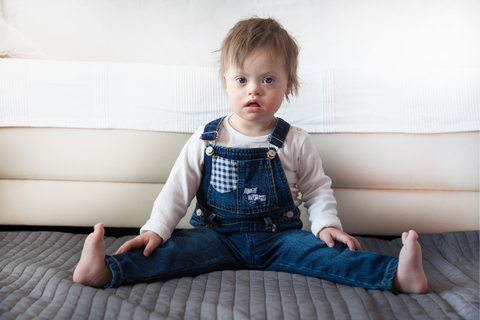Guest Post By Genevieve Kane, MSN, RN
Down syndrome is when an individual has an extra copy of chromosome 21 in their cells. Down syndrome affects approximately 1 in every 700 children, and about 6,000 babies are born with the condition yearly in the United States, per the Centers for Disease Control and Prevention (CDC).
No one knows what causes Down syndrome exactly, but we know certain risk factors exist, such as a female aged 35 years or older when pregnant.
Here are three key facts to know about Down syndrome.

3 Facts About Down Syndrome
While many think of Down syndrome as one condition, the CDC explains there are three different types of Down syndrome.
Trisomy 21: This is the version of Down syndrome you are likely most familiar with. Over 95% of individuals with Down syndrome have Trisomy 21. Typically, individuals have two copies of chromosome 21. Individuals with Trisomy 21 have three copies of chromosome 21.
Translocation Down Syndrome: This is the second most common version of Down syndrome but is relatively rare. Only about 3% of individuals have this type of Down syndrome. In translocation Down syndrome, the individual has an extra chromosome 21 or part of an extra chromosome 21. However, it is attached to a different chromosome instead of being a separate chromosome.
Mosaic Down syndrome: Mosaic Down syndrome is the least common version of Down syndrome. Only about 2% of individuals with Down syndrome have this version. With mosaic Down syndrome, an individual has three copies of chromosome 21 in some, but not all, of their cells. Therefore, individuals with this type may have fewer features of Down syndrome depending on how many cells have the extra copy of chromosome 21.

Characteristics of Down Syndrome
Nemours KidsHealth explains kids with Down syndrome often present with defining physical features. These include a flat facial profile, eyes that slant upward, smaller ears, and a tongue that may stick out.
Children with Down syndrome may also develop at a different pace and are at risk of various health conditions. For example, a baby may have lower muscle tone and learn to sit up or crawl slower than their peers. In addition, they may have a speech delay and reach other milestones later in life.
Children with Down syndrome are also at a greater risk of various medical conditions. These include, but are not limited to:
- Congenital heart defects
- Problems with vision and hearing
- Seizures
- Thyroid issues
- Gastrointestinal issues
- Breathing problems, such as sleep apnea
- Higher risk of ear infections or pneumonia
- Obesity
- Childhood leukemia
Down Syndrome Affects Each Person in Different Ways
While a diagnosis of Down syndrome can be scary, it is essential to recognize Down syndrome affects each child differently. Children with Down syndrome will still reach many milestones—they will simply do so at their own pace.
And numerous individuals with Down syndrome demonstrate it is possible to pursue your dreams, regardless of the obstacles. Insider, Inc. lists several individuals with Down syndrome who are crushing their goals.
For example, Sujeet Desai knows how to play seven instruments and has performed at Carnegie Hall. Zach Gottsagen is an actor and presented at the Oscars in 2020. Finally, Madeline Stuart is a professional model. These are only a handful of individuals with Down syndrome defying stereotypes.

Dr. Noze Best Supports Those With Down Syndrome
Children with Down syndrome are more likely to have various ears, nose, and throat (ENT) health-related concerns. Dr. Steven Goudy, the founder of Dr. Noze Best, is inspired by the Down syndrome population and has pledged a portion of his company’s proceeds to the National Down Syndrome Congress.
Dr. Goudy sincerely believes in helping babies breathe better and strives to help provide peace of mind to all parents, including those caring for children who may have complex medical needs such as Down syndrome.
If you enjoyed this post, you will also love:
- 5 Causes of Ear Pain
- What Parents Need to Know About Speech Delay and Starting Speech Therapy
- Helping Jed Breathe Easy
- What is Down Syndrome and How Can the NozeBot Help?
Genevieve Kane, MSN, RN, is a mother of four and a registered nurse with a background in pediatrics. When she's not working, you can find her cooking up tasty family dinners or keeping up with her kids on a hiking trail in her home state of Colorado.
The Nozebot is a battery-powered suction device designed to clear nasal congestion in babies and children.



